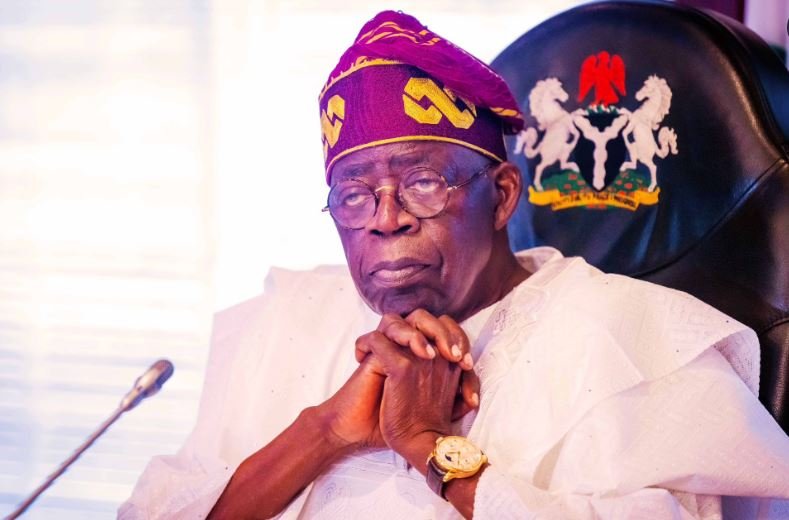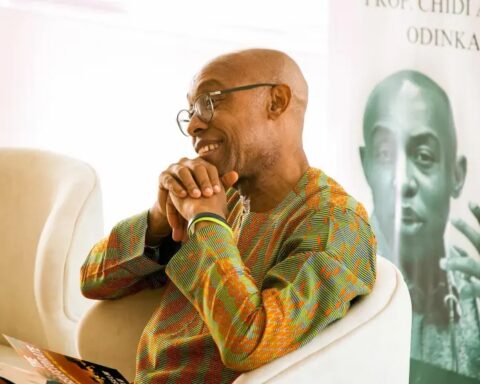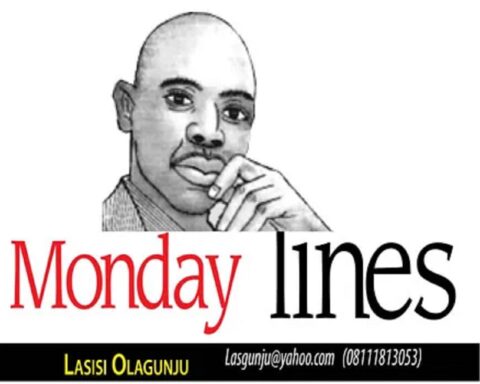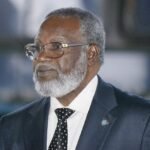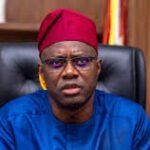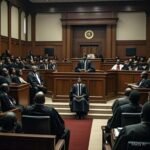· Emilokan is not an economic philosophy…You have to first come to power on the merit of your ideas, not on the number of bullion vans you can summon over the weekend – Adewole Adebayo, political commentator on Arise TV
The Guardian has never been a sensational newspaper. It prides itself as a liberal newspaper founded on the principles of truth, objectivity, fairness and constructive engagement with all parties to the story, as the benchmarks of a quality newspaper (which is feted in Journalism as a “more serious newspaper, which gives detailed accounts of world events, as well as reports as on business, culture and society – considered to deal seriously with issues and to have high editorial standards,” according to Collins dictionary).
The first Nigerian newspaper to engage PhD holders and professors as full-time members of staff (on the editorial board), whose two current title editors are PhD holders, The Guardian can be summarized thus: an ideas market place where issues are intellectualized before an editorial opinion or report can be delivered.
But last week, The Guardian broke with tradition: it ‘severed ties’ with the political establishment, with which it had hitherto sat rather comfortably, and practically snapped when, in a fit of rare rage, it told the Tinubu administration that the streets have become boiling cauldrons and should not be allowed to explode before the issues generating the heat in the polity are addressed.
Writing under the headline ‘Misery, harsh policies driving Nigerians to desperate choices’, the newspaper lashed out: “Nigerians were exhilarated with the return of democracy in 1999, but 25 years on, the buccaneering nature of politicians, their penchant for poor service delivery, morbid hatred for probity, accountability, and credible/transparent elections, among others, are forcing some flustered citizens to make extreme choices, including calling for military intervention.
“Deep despondency permeates every facet of the polity consequent upon soaring cost of living.
“And while the political elite splurge on fine wines and exotic automobiles amid poor service delivery, calls for regime change could become more strident in the days ahead even though military insurrection holds no solution to the country’s woes.”
Expectedly, the Presidency took umbrage at the report. Presidential spokesman, Bayo Onanuga accused the newspaper of “openly inciting unrest against President Bola Tinubu’s Administration and advocating regime change under the guise of journalism.”
For its part, The Guardian vehemently rejected the charge, insisting that it had only run a factual, well-researched report aimed at drawing the presidency’s attention to the nation’s restive streets, in the hope that Abuja would know what to do to mollify the selfsame streets.
If you ask me, Mr. Onanuga’s reaction to The Guardian report is a reflection of the impulsiveness that has defined the nation’s politics since the advent of the APC administration in Nigeria in 2015, but especially in the past one year plus of the Tinubu Presidency. The constant mischaracterization of every critic of the government or, for that matter, the president, as an enemy or a hater of the president or a wailer bellyaching over loss of election, can only speak to the exertions of a national political leadership that has failed, it would seem, to develop a process of introspection that should, by now, have elevated our national political conversations over and above the assumed unimpeachability of the political sagacity and economic management wizardry of the eternal king of Lagos.
In life and in politics, there are people or groups or institutions one must listen to. As an institution, The Guardian is well regarded in Nigeria for its unlikeliness to hold a position – political, cultural or socio-economic – unless well considered. Its report on the popular, hardship-induced anger against the nation’s political leadership ought to be cause for a sober reflection on the part of the Tinubu Administration’s insiders not reason to pillory critics. Onanuga’s abrasive response to The Guardian’s nail-on-the-head report didn’t, to say the least, make any case for the president.
The problem, it seems, is that President Tinubu and team are yet to transition from their Asiwaju-the-infallible-Lagos-suzerain mindset to a broader vision of politics and governance that national leadership demands. It is instructive that more than 80 percent of the most critical governance and institutional appointments that the president has made, since coming to power nearly one and half years ago, are not only Yoruba but also – and quite tellingly – from among his Lagos crowd.
Which may explain why while things are going awry every day for the Administration and country, the president, apparently convinced by his handlers that he is repeating the “Lagos miracle” as President of the Federal Republic, seems to be working, walking and talking with the swagger of a leader running a high-performing government. Who will tell the president that The Guardian is, indeed, right, that the streets are angry?
‘Nigeria among the worst governed country in Africa’
In its 2024 report, the Mo Ibrahim Foundation, Africa’s most prestigious leadership/governance watch group, ranked Nigeria among worst-governed countries in Africa, coming 33rd among 54 countries in Africa.
The Foundation cited bad and deteriorating governance in the last 10 years for its verdict on Nigeria along with 10 other countries in this category.
In the report -2024 Ibrahim Index of African Governance (IIAG)- Nigeria slumped three places from 30th on the continent to 33rd, making it one of the worst-ruled states since 2014.
Established in 2006, the foundation says it is dedicated to strengthening the African voice on global challenges, especially by providing data and analysis to assess continental challenges.
Published since 2007, the IIAG assesses the public governance performance of 54 African countries every two years over the last available decade. IIAG data comes from 49 independent sources, some of which are financially supported by the Mo Ibrahim Foundation.
It is just as well that the Foundation has published its damning verdict on the nation’s governance challenges. And it would be interest to see Onanuga’s reaction to Mo Ibrahim. Would he also gon on the offensive against him?
The truth, however, is that well before the report, we had always known that Nigeria was very badly run, especially in the past nine years plus. It is within this period that we also became the poverty capital of the world and today, among the 20 hungriest nations on planet earth.
“Our nation remains the poverty capital of the world, with our per capita income crashing further from $1700 in 2023 to $1109 this year,” Mr. Peter Obi, former two-term Governor of Anambra State presidential candidate of the Labour Party (LP) in the February 25, 2023 presidential election, said two days ago while reacting to a call for a new luxury jet for Vice President Shettima so soon after the President’s $150m’s. “Are these not the issues that should be prioritized by committed leaders?
“Our national electricity grid has so far collapsed eight times this year alone and 105 times in the last 10 years, plunging our small businesses into great losses and households into darkness.
“In the past 15 months, several businesses have closed down or become distressed due to the harsh economic environment in the country.
“Are these not the issues that should preoccupy us as leaders, rather than being consumed by our selfish desires for needless luxury at the expense of the people we are called to serve?”
Cause of the woes
Nigeria became the poverty capital of the world under Buhari and is now among the 20 hungriest under Tinubu. That is to say that in the nine years of APC Administration, the country has all but been run aground. And while some many not look at it that way, the major cause of our woes can be traced to the failure of the two APC administrations so far to draw from the vitality of our diversity to run efficient administrations: their politics has been decidedly wrong.
Consider Buhari. The effete General took nepotism, the only factor that drove most of his appointments into strategic governance positions in his eight-year tumultuous administration, to an unprecedented height. Now, Tinubu has honed it into an art. And yet the consequence of insistence on filial-based, non-merit system of appointment is that it denies the country the benefits of the plurality of ideas often needed to tackle emergency situations as Nigeria has presently found itself in. It leaves us with a set-up in which participants would appear to owe allegiance more to ‘their brother’ than to the country and who tend to see every opponent of the president as an enemy of their brother or their tribe. Needless to say that such a set-up removes every element of the inclusivity that defines participatory democracy, and creates a ‘we versus them’ syndrome that the country is currently contending with under Tinubu. Or is this president giving the rest of us any sense of belonging?
It serves no national interest that practically everyone who is talking to the president about monetary and fiscal policies of the administration, advising him on security, internal revenue, law and order, information and technology, indeed, practically everything that defines democratic governance in the modern era, is not only from the president’s tribe but also his buddy or subordinate from his days in Lagos as Governor, in a country as diverse as Nigeria, with about 350 ethnic groups.
It means, in essence, that the greatest challenge President Tinubu’s government faces is not the impact of the global economic crisis on Nigeria or the nation’s seemingly intractable security challenges but the president’s politics, which seems to centre primarily around his personal interests and survival. And it isn’t even about the APC, a party that may well have Tinubu as its second name. Of course, the emilokan philosophy has shown that Tinubu has never developed a broad vision of Nigeria beyond his personal life-long ambition of answering president.
That may explain the lack of confidence or trust in any vibrant non-Yoruba persons to key into and help to drive his vision. That may also explain the seeming concentration on politics and politicking to the detriment of governance. Not a few would agree that the current disarray in the opposition party camps has the imprint of the Jagban Borgu. Or could virtually all the other political parties, which participated in the 2023 general election and won some legislative seats and state governorships, have suddenly splintered one year plus after successful electoral outings? It is as if someone is working towards a sole presidential candidacy in politically diverse Nigeria!
So, to analyse the nation’s current socio-economic challenges and seek solutions thereto, look in the direction of politics, the president’s politics. For, therein lies the problem.
